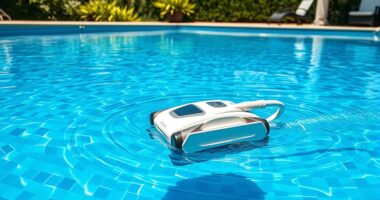Automatic pool cleaners usually last between 3 to 8 years, depending on how well you maintain them, how often you use them, and the build quality. Keeping the filters clean, inspecting parts regularly, and following manufacturer guidelines can extend their lifespan. Worn or damaged components might shorten their durability, but proper care helps maximize your investment. If you want to learn tips on how to make yours last even longer, keep exploring these proven maintenance strategies.
Key Takeaways
- Most automatic pool cleaners last between 3 to 5 years with proper maintenance.
- Regular cleaning and inspections can extend their lifespan beyond the average.
- Wear and tear on brushes, wheels, and filters typically occur within 2-3 years.
- Advanced models with enhanced durability features may last longer with proper care.
- Neglecting routine maintenance can significantly shorten their operational lifespan.

Automatic pool cleaners can be a valuable tool for keeping your pool pristine, but understanding how long they last is key to making a smart investment. These devices can save you time and effort, but like any equipment, they require proper care to maximize their lifespan. Regular maintenance tips are essential for keeping your cleaner functioning at its best and extending its longevity. First, always check and clean the filter cartridges or debris bags after each use. A clogged filter puts unnecessary strain on the motor and reduces cleaning efficiency, which can lead to earlier wear and tear. Rinsing these parts with water and inspecting them for damage helps prevent buildup and keeps your cleaner operating smoothly.
Another maintenance tip involves inspecting the brushes, wheels, and other moving parts periodically. Over time, these components can become worn or damaged, impacting the cleaner’s ability to pick up debris effectively. Replacing worn brushes or damaged wheels promptly ensures your cleaner continues to work efficiently and reduces the risk of further damage to internal parts. Additionally, keeping the track or wheels free of debris and obstructions prevents unnecessary strain on the motor and helps maintain energy efficiency. Incorporating regular inspections can help catch potential issues early before they cause significant damage. Regularly checking the manufacturer’s guidelines for specific maintenance recommendations can also help extend your cleaner’s lifespan.
Speaking of energy efficiency, a well-maintained automatic pool cleaner consumes less power, saving you money on electricity bills. When your cleaner operates smoothly, it doesn’t have to work harder than necessary, which means less energy wasted. Ensuring proper calibration and checking that the cleaner’s navigation system is functioning correctly can also improve efficiency. Many modern models come with programmable schedules; using these features can optimize cleaning times, reducing energy consumption during peak hours. Moreover, as technology advances, some models incorporate automated navigation systems, which can further improve cleaning effectiveness and reduce wear on moving parts.
Another tip for prolonging your cleaner’s lifespan is to store it properly when not in use, especially during winter or extended periods of disuse. Store it in a dry, cool place away from direct sunlight, which can degrade plastic parts and batteries. Regularly inspecting power cords and connections for damage can prevent electrical failures that might shorten the cleaner’s lifespan. Proper storage and care can significantly extend the operational life of your device. Additionally, keeping an eye on recent industry innovations and updates can help you select models with advanced durability features.
Ultimately, the lifespan of your automatic pool cleaner depends heavily on how well you maintain it. Following these maintenance tips not only enhances its durability but also ensures it operates at peak energy efficiency. Proper care means your investment pays off in the long run, providing reliable cleaning performance season after season. By staying attentive to its needs and addressing issues early, you’ll keep your pool sparkling while prolonging the life of your automatic cleaner.
Frequently Asked Questions
Can Automatic Pool Cleaners Be Repaired or Should They Be Replaced?
When your automatic pool cleaner stops working, you might wonder if it’s worth repairing or if you should replace it. You can explore repair options like fixing the brush or replacing the motor, which are often more affordable than replacement costs. If repairs are extensive or costly, replacing your cleaner might be smarter. Assess the damage carefully, and consider the long-term benefits before making a decision.
How Do Different Brands Compare in Longevity?
When comparing brands, you’ll find that durability, longevity, and performance vary notably. Some brands excel in durability, lasting several seasons with minimal repairs, while others may require more frequent replacements. To make an informed choice, consider the longevity comparison, reading reviews and evaluating warranty coverage. Ultimately, selecting a brand known for robustness ensures your automatic pool cleaner remains reliable, saving you money and hassle over time.
What Maintenance Tips Extend the Lifespan of My Cleaner?
To extend your automatic pool cleaner’s lifespan, regularly perform filter replacement to prevent clogs and maintain efficiency. Additionally, keep up with brush maintenance by cleaning and replacing brushes when worn, ensuring peak movement and cleaning performance. Avoid neglecting these tasks, and you’ll help your cleaner work smoothly longer, saving you money and hassle. Consistent care keeps your device in top shape, so it lasts for years to come.
Are There Signs Indicating My Cleaner Needs Replacement Soon?
Think of your pool cleaner as a loyal workhorse, but even the sturdiest horse shows signs of wear. If you notice it struggles to clean or skips areas, it might be time for a replacement. Check warranty coverage and monitor the battery lifespan—if the battery drains quickly or the warranty is near expiration, these are clear signs. Staying alert helps you avoid unexpected breakdowns and keep your pool pristine.
How Does Pool Usage Frequency Affect Cleaner Lifespan?
Your pool’s cleaning frequency directly impacts your automatic pool cleaner’s lifespan. If you swim often, there’s more pool debris to remove, so the cleaner works harder and wears out faster. Regular use means your cleaner faces increased strain, which can reduce its lifespan. To extend its life, balance cleaning frequency with proper maintenance, clear debris regularly, and avoid overloading the system, ensuring your cleaner stays efficient longer.
Conclusion
So, while automatic pool cleaners typically last 3 to 5 years, don’t worry if yours needs a little extra TLC. Regular maintenance and prompt repairs can extend their lifespan, saving you from frequent replacements. Plus, investing in a quality model might cost more upfront, but it pays off in durability. Remember, with proper care, your cleaner can keep your pool pristine well beyond the average lifespan—making it a worthwhile addition to your pool maintenance routine.









